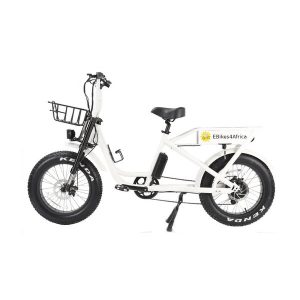
Agriculture
June 22, 2024
SunCycles Deliver-E-Bike
Read SolutionImplemented by
SunCycles
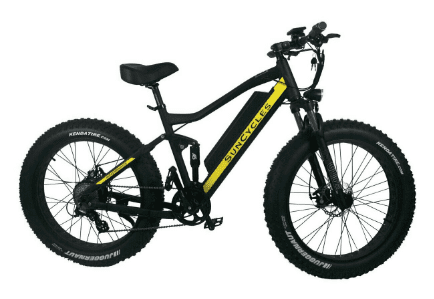
Updated on June 22, 2024
·Created on September 13, 2019
Suncycles Electric Fatbike is an electric bicycle made in Namibia.
SunCycle Electric Fatbike is an electric bicycle that targets African commuters – ranging from children, senior citizens and people with disabilities. The bicycles run on a battery that can be charged from solar power or through an electric 220 V AC power plug.
Target SDGs
SDG 7: Affordable and Clean Energy
SDG 9: Industry, Innovation and Infrastructure
Market Suggested Retail Price
$2,167.00
Target Users (Target Impact Group)
Household, Community
Distributors / Implementing Organizations
SunCycles
Regions
Africa
Manufacturing/Building Method
SunCycles can either retrofit a standard bicycle or make an e-bike from scratch.
Intellectural Property Type
Trademark
User Provision Model
Users can get an original e-bike from the manufacturer's site or go to the manufacturer's workshop to convert a bike to an e-bike.
Distributions to Date Status
200Interview with manufacturer
Capacity
1
Gear Ratio
8
Maximum load capacity (kg)
100 kg + passenger Interview with manufacturer
Design Specifications
Specifications:
Technical Support
Users can refer to the user manual available online or contact the manufacturer.
Replacement Components
Battery, motor, controller, sensor, LCD display, solar kit
Lifecycle
20000 km or 1000 charges, whichever comes firstInterview with manufacturer
Manufacturer Specified Performance Parameters
The manufacturer seeks to provide e-bike solutions to all corners of the African continent.
Vetted Performance Status
None on the whole bike, but on the different parts (battery, motor, etc.) to evaluate component lifetimeInterview with manufacturer
Safety
The users are required to wear helmets while riding a bicycle as per Namibia's Road Traffic and Transport Regulations. The manufacturer also provides safety tips in the user manual concerning battery maintenance and tire pressure.
Complementary Technical Systems
A charging system - either an electrical grid or a solar panel system - is needed to recharge each bicycle.
Academic Research and References
Fishman, E. and Cherry. C., 2015, E-bikes in the Mainstream: Reviewing a Decade of Research, Transport Reviews, 36(1), pp. 72-91.
Rose, G., 2012, E-bikes and urban transportation: emerging issues and unresolved questions, Transportation, 39(1), pp. 81-96.
Fyhri, A. and Fearnley, N., 2015, Effects of e-bikes on bicycle use and mode share, Transportation Research Part D: Transport and Environment, 36, pp. 45-52.
Schleinitz, K., Petzoldt, T., Franke-Bartholdt, L., Krems, J. and Gehlert, T., 2017, The German Naturalistic Cycling Study – Comparing cycling speed of riders of different e-bikes and conventional bicycles, Safety Science, 92, pp. 290-297.
Compliance with regulations
It is considered a conventional bicycle in Namibia and South Africa as it is under 30 kg. It fulfills the regulations of Euro Pedelec Norm.Interview with manufacturer
Evaluation methods
None.Interview with manufacturer
Other Information
More information about the product is available in the user manual and products & services manual
Other information is available here
Read more about SunCycles Fatbike specification in their Data sheet

Agriculture
June 22, 2024
Implemented by
SunCycles
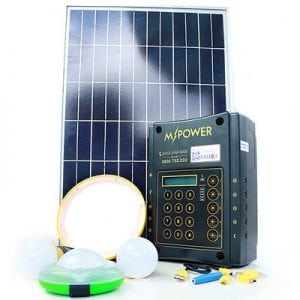
Agriculture
January 28, 2024
Implemented by
Off-Grid Electric

Agriculture
June 22, 2024
Implemented by
Emrax

Agriculture
January 27, 2024
Implemented by
Sunspot PV LLC

Agriculture
June 27, 2024
Implemented by
Bodawerk International Ltd

Agriculture
June 20, 2024
Implemented by
Electric Vehicle Association of Thailand (EVAT)

Agriculture
June 23, 2024
Implemented by
Motivo Engineering
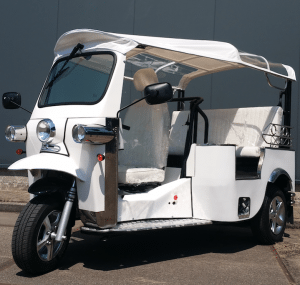
Agriculture
June 30, 2024
Implemented by
Tuk Tuk Factory

Agriculture
June 27, 2024
Implemented by
EVUM Motors
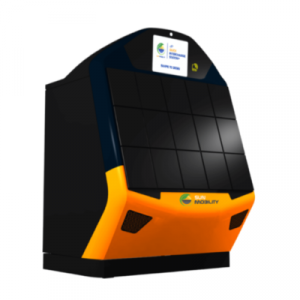
Agriculture
June 28, 2024
Implemented by
Sun Mobility
Have thoughts on how we can improve?
Give Us Feedback